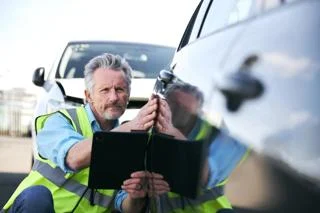
Covid-19, Brexit deal and EVs all rank high on the list of challenges, reports Stephen Briers
Covid-19 is casting a long shadow over the fleet sector and is likely to remain the biggest challenge for the next couple of years, according to the UK’s top leasing companies.
However, it has also shone a spotlight on the pressing need for global action to tackle climate change.
At a local level, many businesses are already accelerating their electric vehicle (EV)plans to meet their own ambitious targets.
They hope, of course, that manufacturers will be able to ramp up production to meet the growing demand.
January will also see the UK finally break ties with Europe, although the uncertainty over a future trade deal is another issue vexing FN50 executives.
Craig McNaughton, corporate director at the UK’s biggest leasing company Lex Autolease, says: “We are not out of the woods yet with Covid-19 and that, combined with an uncertain Brexit outcome and transition, is having massive impact on business confidence at a time when many are still trying to come to terms with the introduction of WLTP and how best to amend their fleet policies to reflect these new circumstances.”
Ah yes, WLTP. The Worldwide harmonised Light vehicle Test Procedure was introduced in two phrases between September 2017 and 2018 for cars, with vans following the same timelines but a year later.
WLTP figures are now used for benefit-in-kind (BIK) calculations for cars registered from April 2020; cars registered before that date are based on the old NEDC (New European Driving Cycle) against a different set of BIK thresholds.
The Fleet News Fleet200 members identified WLTP as a concern and they were looking at the implications of the new testing results on car drivers’ tax liabilities with a view to rewriting company car policies.
However, as with the FN50, the UK’s biggest fleet operators also pointed to coronavirus and EVs as their two biggest challenges over the next year or so. Concerns over the latter encompassed implementing robust policies, understanding workplace charging requirements and supply shortages.
Naughton again: “OEMs must renew efforts to bring sufficient volumes of affordable low emission cars and vans to meet customer needs in a market that is likely to see suppressed volumes for several years.”
Don’t get left behind
Given anticipated shortfalls, fleets should be speeding up their adoption policies to ensure they aren’t left behind in the race to secure their orders.
Resource efficiency and sustainability “should be central” to company strategy, according to Nick Brownrigg, CEO, Alphabet GB.
“Fleet managers cannot risk leaving this to the last minute as they could face shortages in vehicle availability and, in a worst-case scenario, be taken out of action until new compliant vehicles are back in stock,” he says.
“By taking steps now on sustainability and climate protection, fleet managers will be able to anticipate changes to urban transport policies that we may see in the short term.”
He adds: “The UK’s Net Zero strategy remains a pinnacle moment in the fleet industry’s future.
"The importance for genuine environmental sustainability is something customers need to be playing a role in today, so making vehicles compliant sooner rather than later is no bad thing.”
Fears over charging infrastructure are largely unfounded as the public network rises, currently almost 20,000 devices with 34,500 connectors, up from 29,500 connectors at the start of the year.
They are serving just more than 164,000 battery electric vehicles (BEVs) and 209,200 plug-in hybrids (PHEVs).
However, there are hotspots (south-east/cities) and cold spots (north-west/rural areas) and the uneven distribution will deter some potential EV drivers.
Nevertheless, Jon Lawes, managing director at Hitachi Capital Vehicle Solutions, says: “With the availability of charging infrastructure ever-improving, coupled with the financial incentives that are available, EVs are now an attractive and viable option for businesses.”
There is more to do, though, to keep pace with growth, claims Jonathan Smith, relationship director at Zenith.
“The charging infrastructure is still not widespread or deep enough to accommodate current levels of demand in certain areas,” he says.
“It needs to keep pace with the uptake of BEVs.”
Meanwhile, Simon Stanton, director of client management at Venson Automotive Solutions, voices concerns about the robustness of the existing infrastructure, which, he fears, could leave motorists stranded if charging points are not working.
“For example, how are charging posts being maintained?” he asks. “Who ‘owns’ the SLA relationship, is it between the local authority and the charge point provider or the charge point provider and the driver because they are paying the subscription to the charge point provider?
"With drivers used to easy access to a range of fuel stations, will charge point/local government be able to deliver the same confidence? What does a driver do if they get to a charge point and it’s not working, and the potential nearest charge point is too far away for the charge left in the vehicle battery?”
Part of the solution will be to change the culture on fuelling, from an empty-full mentality to a ‘little and often’ approach.
Home and work chargers will provide the big daily boost; public chargers should be used for quick top ups.
A crucial part of the strategy, therefore, will be investment in workplace charging solutions, an area where some companies run into issues with landlord permissions or capacity overload on local substations.
Equally, many companies expect company car drivers to install their own home chargers – either self-funded with the help of Government grants or paid for by the company.
Close Brothers and Mitie are at the opposite ends of that particular spectrum.
At Close Brothers, employees must sign a disclaimer when they order their vehicle that they will have a charger fitted at their home address at their expense and that they will charge the vehicle at home or at the office.
They are not allowed to reclaim the electricity cost.
However, Simon King, director of sustainability and social value at Mitie, contends: “Our view is that the employee has to be able to charge their vehicle for work.
"If we charge their vehicle at the office there is no BIK payable on them having that electricity, so we think it is perfectly reasonable to pick up the cost (of the home charge point) so they can charge at home and go about their work.”
So far, Mitie has installed 650 charge points across homes and offices.
Residual value worries
Two leasing companies raise concerns about residual values (RVs). Traction Finance is uneasy about the “impact the AFV (alternative fuel vehicle) trend will have on (internal combustion engine) RVs”, while ICR Leasing senior manager Thomas Ryan is more troubled about managing the actual “residual risk when it comes to alternative fuels”.
While the greater attention afforded to climate change and air quality issues is a silver lining to a very dark cloud, the fall-out from the coronavirus pandemic embraces economic anxieties and wholesale changes to the way UK business operates.
Not everyone is as blunt as Alliance Asset Management, whose biggest worry is “the demise of the company car”.
Nevertheless, there will be disruption, with new working practices likely to include the way people order and receive their vehicles, according to Lex Autolease’s Naughton.
“Covid-19 is likely to accelerate the transition away from traditional retail models, including the OEM distribution networks which will remain under commercial strain,” he predicts.
Arval believes the economic consequences of coronavirus, combined with uncertainty over future trade agreements, will be the catalyst for wholesale reviews of supplier relationships.
Arval UK managing director Miguel Cabaça points to the “significant negative impact” causing a GDP dip of 20% in Q2 and the first recession for 11 years.
“In light of this significant financial and operational challenge, fleet suppliers will review how they operate in partnership with other fleet service suppliers and with clients. This, we anticipate, will result in changing well-established processes to meet the needs of clients and their drivers,” he says.
“The trajectory that the country follows in its recovery from the economic impact of coronavirus and the implications of Brexit will decide how
challenging the next two to three years are for the fleet sector.”
However, he sounds an optimistic note: “With the right mobility solutions in place and the increasing uptake of zero-emission vehicles, the sector is in a good position to weather that storm.”
Flexibility and agility will be two key elements to build into any fleet strategy, according to SG Fleet UK commercial director Chris Salmon, as industry enters a period of economic uncertainty.
“Government policy is likely to be economically driven, and consumer confidence will drive new vehicle uptake to an extent,” he says.
“Being able to invest and plan for the alternative routes fleet could take given the potential impacts from legislation etc. means the successful fleet providers will be ones who build flexibility and agility into their investment and approach over the coming years.”
Liquid Fleet managing director Darren Driscoll agrees.
He says: “Users will demand a much greater variety of offerings than ever before, varying between short-term rental to five-year BCH. Customers will want more flexibility than previously accepted.”
But, while Covid-19 is “probably the biggest challenge” to business prosperity and future travel policies over the next two-to-three years, ALD Automotive fleet consultant Sarah Gray pointsto other issues that could also leave a lasting impression on the market.
“Product diversification, mobility solutions, vehicle supply, digitisation, powertrain shift and Brexit will all have an impact and continue to
challenge the evolution of the fleet industry,” she says.
Costs could rise, predicts Venson’s Stanton, due to Brexit and an uncompetitive trade deal (or, indeed, no trade deal with Europe).
“There is the potential for an increase in vehicle prices and parts and these increases will need to be passed through the supply chain and, ultimately, to the fleet operator,” he says.
“This, coupled with availability of vehicle models and delays in movement of vehicles through borders, could prove to make the next two years an interesting time.”
A hot topic
Mobility is a hot topic for many leasing companies which are bidding to become mobility providers rather than simply vehicle funders.
Arval, Free2Move, LeasePlan, Alphabet and Kinto (formerly Inchcape Fleet Solutions) have all set out their mobility strategies in recent years and others are sure to follow.
Alphabet’s Brownrigg believes Covid-19 will hasten the uptake of mobility solutions, although several of those elements – car/ride share and public transport – have become less attractive propositions for many people due to social distancing and santisation priorities.
Nevertheless, local authority transport policies will adapt to exploit recent air quality improvements and fleets will need to manage these changes.
“What has also become evident from Covid-19 is the importance of digitalisation,” Brownrigg adds.
“The industry needs to react quickly to this growing demand and have the online services in place to handle shifting customer needs.
"This will be key for the future of any fleet business and customers may look elsewhere if this is not in place.”
He also comes back to the importance of fleet agility and throws down the gauntlet to his FN50 colleagues to be equally nimble and responsive.
“Leasing companies need to offer varied and sustainable solutions, accessible digitally, in order to align with changing customer requirement in the ‘new world’,” Brownrigg says.
“The industry is in a transitionary state and we all need to work together to shape the future of fleet.”





















Login to comment
Comments
No comments have been made yet.